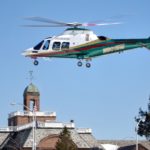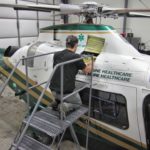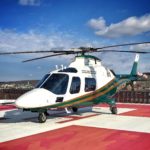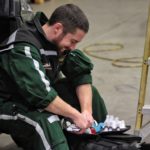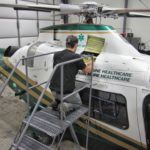A young man with extensive facial injuries in Limerick. A 65-year-old woman with severe asthma at Southern Maine Medical Center—Goodall Campus. A man from New Hampshire with serious injuries after a motorcycle accident in Acton. A baby girl at Wentworth-Douglas with a dangerous respiratory infection. A retired gentleman suffering from a head injury in Cornish.
These are just a few of the patients LifeFlight of Maine has helped from its new base of operations in Sanford, which marked its one year anniversary on March 20. With a helicopter and critical care team permanently stationed in Sanford 24-hours-a-day, LifeFlight has been able to help a growing number of patients who need a higher level of emergency care.
LifeFlight was started nearly 20 years ago when Eastern Maine Healthcare and Central Maine Healthcare opened bases in Bangor and Lewiston. In recent years, changes in the healthcare landscape and shifts in the state’s population have resulted in a growing number of calls for help. LifeFlight answered that need with the addition of an airplane at our Bangor base in 2015, and then with the purchase of a third helicopter and the creation of the Sanford base last year.
Since opening last March, the helicopter stationed at the Sanford base has transported patients more than 15,000 miles. One third of the transports completed by the Sanford team were for patients with traumatic injuries, while about 15% were for cardiac emergencies.
LifeFlight works closely with many southern Maine fire departments and ambulance services to transport patients to trauma centers when every minute counts. The helicopter and flight crew have also served as a critical link to the smaller community hospitals in southern Maine. Previously, transfers to larger specialty centers in Portland or Boston took hours by ground ambulance, but are now done in a fraction of the time with the helicopter. For example, the one-hour drive from Goodall to Portland can now be completed in about 12 minutes. That means patients get the care they need faster, giving them a better chance at survival and recovery.
That’s just what happened in the case of New Hampshire resident Dana Seaboyer. Critically injured and bleeding badly after a motorcycle accident in Acton, the flight crew gave Dana the blood he needed and got him to specialists at Maine Medical Center. Today, he’s back home and looking forward to getting back on his bike.


